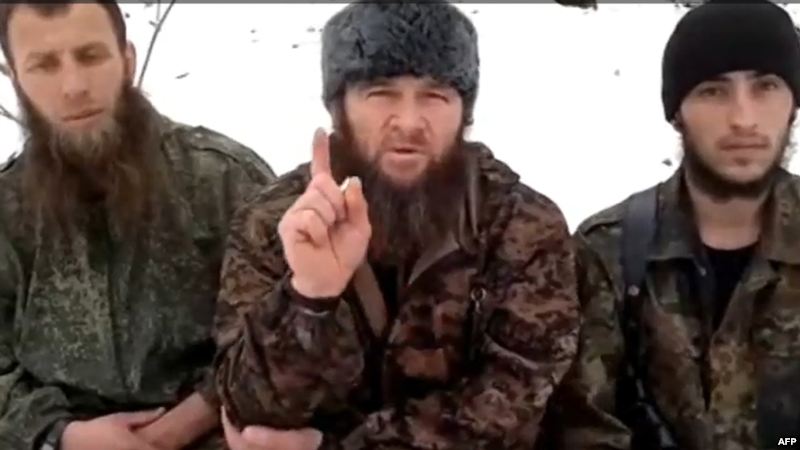
Chechnya’s Insurgency Stubbornly Remained Active in 2012
Publication: Eurasia Daily Monitor Volume: 10 Issue: 5
By:

Out of 137 official news releases in connection to the armed opposition’s activities in Chechnya in 2012, 71 were about the arrests of rebel supporters. One-third of those arrested on charges of providing support to the rebels were women. Meanwhile, 28 militants and 42 service men were killed last year, and 72 servicemen were injured in the violence, meaning that the government forces’ losses were almost three times greater than the rebels’ losses. The government also claimed that 25 rebel arms caches were captured during 2012. There were two suicide bomb attacks and eight ordinary bombings targeting servicemen in various parts of Chechnya in 2012. Nine people were kidnapped or disappeared in the republic in 2012 (https://astrakhan.kavkaz-uzel.ru/articles/155726/).
The government forces suffered the majority of their losses in Chechnya last year in open armed clashes with the militants. There were only eight bomb attacks for the entire year. The two suicide bombings killed only four servicemen and injured two others. So in open clashes, the militants apparently had a clear advantage over the government forces. In an attempt to explain the government forces’ failures, Russian Security Council Secretary Nikolai Patrushev admitted that they were related to a change in tactics by the militants. “Now they operate in small and scattered bandit groups, which are harder to locate and neutralize,” Patrushev said (www.regnum.ru/news/kavkaz/chechnya/1605887). Patrushev was also forced to admit that, after 14 years of armed conflict in the North Caucasus, the Russian government “[has] not been able to fully remove the causes and conditions that make [the militants’] criminal activities possible, such as intercepting their financial and ammunition supplies, or effectively counter the process of young people being drawn into armed groups.” Thus, Moscow’s objectives in the region that were topical back in 1999 remain as important for the Russian security services today.
At the same time, Ramzan Kadyrov last October repeated his claim that there were only 35–40 rebels in the republic (https://ria.ru/defense_safety/20121017/903608475.html), while in that same month, Chechen Interior Minister Ruslan Alkhanov reported that 35 rebels had been killed between January and September 2012 (https://ria.ru/defense_safety/20121016/903141948.html). Thus it will be interesting to learn how many rebels will be reported as having been killed in the period of October–December 2012, even though there was not a single Chechen militant’s death reported during this time.
The Chechen authorities still do not properly understand that they should fight for the republic’s youth, who are increasingly abandoning Sufi values and becoming convenient material for the militants. The discrediting of Sufism leads young people into the ranks of the Salafis. It is not surprising, therefore, that Chechen youth see their future outside Chechnya—abroad. Thus, according to a survey conducted by the magazine DOSh in three higher institutions of the Chechen Republic, only 2 percent of the respondents saw their future in Chechnya and 20 percent in Russia, while 78 percent saw themselves abroad. A total of 1,120 respondents were polled—856 males and 264 females (www.kavkaz-uzel.ru/articles/218032/). This is a vivid result of Moscow’s policies in Chechnya. Just as 14 years ago, when the war started in Chechnya, the Chechens in 2012 again choose Europe as their future destination. Back in 1999, the Chechens were fleeing the horrors of war. Today Chechens make a conscious choice in favor of Europe to escape from ideological terror against the youth of the republic.
The Chechen issue reverberated strongly outside Russia as well in 2012 as reports of Chechen militants fighting in Syria emerged for the first time. The Chechens fought on the side of the opposition against President Bashar al-Assad’s regime, which is protected by Moscow. However, Ramzan Kadyrov denied there were Chechens fighting against the Syrian regime (www.mk.ru/politics/news/2012/07/23/728425-kadyirov-oproverg-soobscheniya-o-chechentsah-voyuyuschih-na-storone-siriyskoy-oppozitsii.html). Nevertheless, the facts that emerged subsequently were more convincing and at a certain point it became impossible to deny the obvious. Assad handed over a list of foreign nationals, including some Chechens, who were killed in Syria while fighting against the government (www.bbc.co.uk/russian/rolling_news/2012/11/121121_rn_syria_un_list.shtml). A short time later, Iranian sources confirmed that the Chechens were among the first who came to help Assad’s opponents (www.regnum.ru/news/kavkaz/chechnya/1608184.html).
Another country where the Chechen theme made headlines in 2012 was Turkey. The Russian security services habitually assassinated emissaries of Chechen insurgent leader Doku Umarov. This time the Turkish authorities managed to capture the primary suspect implicated in many killings—a man of Chechen origin who had Georgian documents identifying him as Ruslan Papaskeri (aka Ali Dabuev) who worked closely with the Russian Federal Security Service (FSB) (https://haber.stargazete.com/guncel/komutanlarin-suikastcisi-gurcu-ajan-cikti/haber-706704).
In other areas, the authorities in Moscow were unable in 2012 to stop the dispute between the leaders of the neighboring republics of Chechnya and Ingushetia. The two leaders clashed over the issue of administrative borders while Moscow silently looked on, having apparently no opportunity to dispel the conflict quickly (https://www.gazeta.ru/politics/2012/08/27_a_4738621.shtml). This crisis vividly showed that Moscow invariably fails to react to the processes in the North Caucasus in an appropriate way as it is always late, just as happened in the case of the squabble between leaders of Chechnya and Ingushetia. It was also Moscow’s own fault that Chechnya became the cause of discord among Russians themselves, who consider their government’s financial injections into the region too costly against the backdrop of the impoverished ethnic Russian periphery.
As Moscow’s reaction to the processes in the region is increasingly insufficient, it is inevitable that new centers of power in the region will start to mushroom, accelerating the process of decentralization even more. This will eventually result in strengthening the positions of the border regions of Russia. Chechnya, as in 1999, remains among the main factors facilitating the process of decentralization of the Russian Federation.




